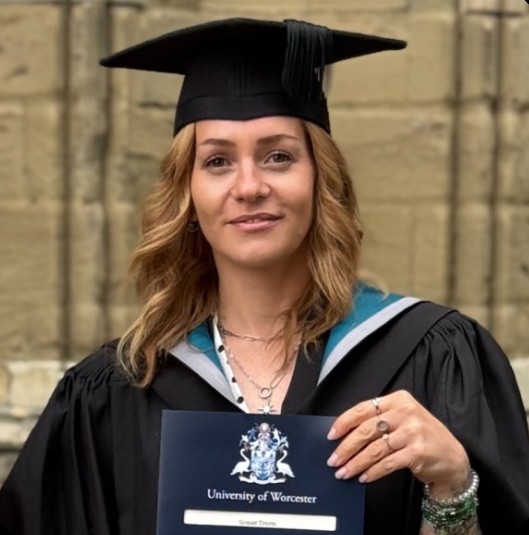Sinead Timms, Class of 2025 graduate from the BA(Hons) Integrated Working with Children and Families Top up degree, shares some of her reflections of her journey through Higher Education to gain her dream job as a Family Support Worker.

Before beginning the BA(Hons) in Integrated Working with Children and Families (IWCF), I completed the Early Years Foundation Degree at the University of Worcester, studying the Flexible and Distributed Learning pathway. At the time, I was working in a nursery and later transitioned into a role as a Teaching Assistant in a primary school. These experiences deepened my passion for working with children and families, but also made me aware that I wanted to progress further in my career. I recognised that to make a greater impact and take on more responsibility, I needed to build on my knowledge and skills through further study. Enrolling onto the IWCF course felt like the natural next step in my professional journey.
The IWCF course came highly recommended by friends who had completed it previously and spoke very positively about their experience. Their feedback gave me the confidence to pursue it myself. One of the key factors that made it an ideal choice for me was its flexibility, it allowed me to continue working full-time whilst studying. This balance was essential, as it meant I could advance my professional development without needing to step away from my existing responsibilities.
Balancing full-time work, academic studies, and family life has been one of the most challenging experiences I’ve faced. Juggling a demanding job while raising two children and committing to a rigorous academic programme required an immense amount of organisation, resilience, and sacrifice. There were many occasions when I had to prioritise studying over other aspects of life, often missing out on social events, personal time, and even moments with my family. At times, the pressure felt overwhelming, but I remained focused on my long-term goals.
What made a significant difference was the support network I found through the course. My peers, many of whom were navigating their own personal challenges, offered not only academic encouragement but emotional support as well. Their belief in me, combined with my own determination, kept me going during the toughest periods. Looking back, the journey was far from easy, but every moment of struggle was worthwhile. The experience has not only strengthened my academic and professional skills but has also shown me what I am truly capable of when faced with adversity.
After completing my studies, I secured a new role in Family Support within a Local Authority. The knowledge I gained throughout the course, particularly during my dissertation, played a key role in both my professional development and my confidence during the interview process. The course not only deepened my understanding but also inspired me to reassess my career path. I came to realise that working in a school setting no longer aligned with the insights I had developed. I wanted to apply what I had learned in a more direct and meaningful way- and my new role now allows me to do exactly that.
I genuinely enjoyed the challenge of the course and found it to be an incredibly rewarding experience. One of the most valuable aspects for me was the opportunity to make meaningful connections between theory and practice. Being able to apply academic concepts to real-life situations helped to deepen my understanding and gave purpose to my learning. Over time, I developed into a more reflective practitioner, someone who continually evaluates their approach and decisions in light of both experience and theory. I often find myself recalling specific modules or lessons and making links to scenarios I encounter in my day-to-day work. It’s both exciting and fulfilling to see how the knowledge I gained in the classroom translates into practical, real-world applications. This has not only improved my confidence but also enhanced the quality of support I can provide in my professional role.
If I could offer any advice to future students, it would be this: keep reading, every day if possible. Staying engaged with the material regularly makes a big difference over time. One practical tip that I can’t stress enough is to start your reference list from day one. It might seem minor at first, but it will save you so much time and stress when deadlines approach. On the days when motivation is low, just turn on your laptop and do a little bit, any progress is still progress, and you’ll thank yourself later. It’s also incredibly important to look after your wellbeing. Take regular breaks, make time for rest, and don’t be afraid to ask for help when you need it. The tutors are incredibly supportive and knowledgeable, and they genuinely want you to succeed. Make the most of their guidance- it can make all the difference.
If you’re interested in either of the courses that Sinead has studied, get in touch to begin your journey through Higher Education.
FdA Early Years (0-8 years) (HTQ), contact Course Leader, Samantha Sutton-Tsang: s.sutton-tsang@worc.ac.uk
BA(Hons) Integrated Working with Children and Families Top Up degree, contact Course Leader, Angela Hodgkins: a.hodgkins@worc.ac.uk
